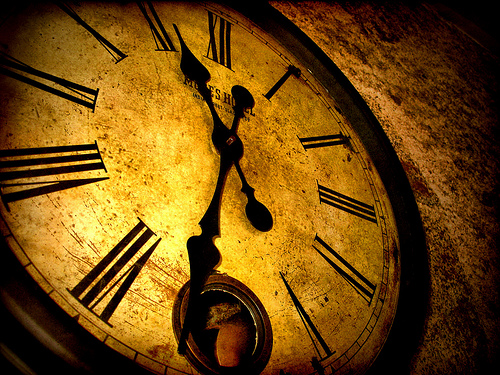
Used with permission, CC: ToniVC
This post is a failure. It's on the subject of patience, and I was assigned to complete it yesterday. Why is it late? Because I confused patience with laziness.
But let's ponder for a moment what the digital age has done to those of us who have honestly considered ourselves patient people.
Those of us who are 30-somethings (give or take a decade or two) have no problem recalling a now-bygone era in which we had a specific procedure for contacting a faraway friend:
- Write postcard
- Place stamp on postcard
- Drop postcard in mailbox
- Wait three weeks for reply
We had a name for this. We called it "normal."
How have we improved in thirty years? Today we fire off an email that took us all of fifteen seconds to write. If we don't have a response back in a few minutes, we're irate.
What happened?
Time is money
We seem to have been poisoned by a couple thoughts:
- My money is more important than your obstacles to getting me my money.
- If time is money, and you're making me wait, then you're using up my money.
This argument looks sensible. But it has a fatal flaw: it turns us all into greedy slavemasters of other people's minutes and seconds, and justifies the transformation in the name of progress. We expect immediate responses, and others expect immediate responses from us. The problem, of course, is that we've conditioned ourselves to assume that each of us is the most important person in the world (when, in actuality, of course, only I am the most important person in the world).
The flip side of patience
Some people say they don't have a problem being patient.
It's easy to say that when you want to hide either that you lack the courage to take action, or you simply don't care. Even though they can have an identical appearance at face value, there's a wide and consequential difference between patience and fear, and a similar difference between patience and apathy.
We should be careful not to be too impressed with those who claim great patience when it is really just a spurious cover for their vanity and pride. We should be even more careful to expose and eradicate such falsity in ourselves.
All that is necessary for evil to triumph is for good men to do nothing.
--Sergei Bondarchuk
--Sergei Bondarchuk
When we use patience as an excuse for inaction, we preserve evil's grip for a while longer.
Deeper thoughts...
Love is patient...
--1 Corinthians 13:4 (NIV)
--1 Corinthians 13:4 (NIV)
...the fruit of the Spirit is love, joy, peace, patience, kindness, goodness, faithfulness, gentleness, and self-control.
--Galatians 5:22-23 (NIV)
--Galatians 5:22-23 (NIV)
...Those who wait on the Lord shall renew their strength...
--Isaiah 40:31 (NKJV)
--Isaiah 40:31 (NKJV)
There is a time for everything...
--Ecclesiastes 1ff. (NIV)
--Ecclesiastes 1ff. (NIV)
Nowhere in these passages is it suggested that patience is a weakness. Meekness and humility may be hallmarks of the individual who embodies all of the above characteristics, but patience is apparently part of a set of characteristics that demonstrates acts of power. The fruit of the Spirit is the fruit of that which created the cosmos ex nihilo.
Patience here is waiting for the right moment to achieve maximum benefit. It is proactive and strategic and intentional. It is the ninja who hides in the shadows for three days, barely breathing. It is the comedian who inserts a dramatic pause at just the right moment before the punchline arrives. It is the God who is there waiting in the midst of the situation before we need him.
"Be holy," God says, "because I am holy" (1 Peter 1:16; cf. Leviticus 11:44, 19:2). If we are to assume that our own holiness is an intentional attempt to mimic the qualities of God, then our benchmark for patience is the dynamic Spirit whose patience is as limitless as is his power.
Wait for it, wait for it. Give it some time.
--Howard Jones, "Everlasting Love"
--Howard Jones, "Everlasting Love"
This post is part of
Bridget Chumbley's One Word at a Time Blog Carnival.
Previous carnival entries have focused on lust, love, church, and peace.
Bridget Chumbley's One Word at a Time Blog Carnival.
Previous carnival entries have focused on lust, love, church, and peace.